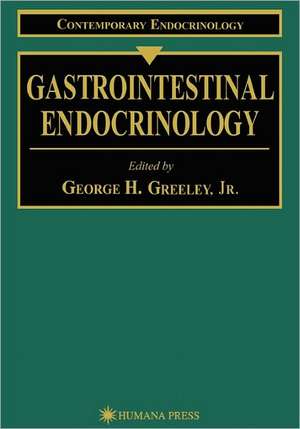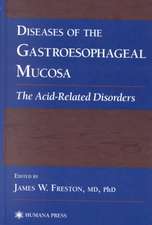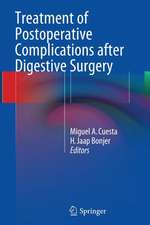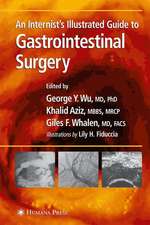Gastrointestinal Endocrinology: Contemporary Endocrinology, cartea 8
Editat de Jr. Greeleyen Limba Engleză Paperback – 9 noi 2010
| Toate formatele și edițiile | Preț | Express |
|---|---|---|
| Paperback (1) | 1623.30 lei 6-8 săpt. | |
| Humana Press Inc. – 9 noi 2010 | 1623.30 lei 6-8 săpt. | |
| Hardback (1) | 1632.41 lei 6-8 săpt. | |
| Humana Press Inc. – 31 dec 1998 | 1632.41 lei 6-8 săpt. |
Din seria Contemporary Endocrinology
- 5%
 Preț: 1121.99 lei
Preț: 1121.99 lei - 5%
 Preț: 674.95 lei
Preț: 674.95 lei - 5%
 Preț: 1049.10 lei
Preț: 1049.10 lei - 5%
 Preț: 1036.49 lei
Preț: 1036.49 lei - 5%
 Preț: 1106.69 lei
Preț: 1106.69 lei - 5%
 Preț: 1089.68 lei
Preț: 1089.68 lei - 5%
 Preț: 1627.85 lei
Preț: 1627.85 lei - 5%
 Preț: 789.60 lei
Preț: 789.60 lei - 5%
 Preț: 934.24 lei
Preț: 934.24 lei - 5%
 Preț: 720.84 lei
Preț: 720.84 lei - 5%
 Preț: 1105.77 lei
Preț: 1105.77 lei - 5%
 Preț: 1106.33 lei
Preț: 1106.33 lei - 5%
 Preț: 1609.14 lei
Preț: 1609.14 lei - 5%
 Preț: 1108.72 lei
Preț: 1108.72 lei - 5%
 Preț: 1440.16 lei
Preț: 1440.16 lei - 5%
 Preț: 1014.59 lei
Preț: 1014.59 lei - 5%
 Preț: 1110.17 lei
Preț: 1110.17 lei - 5%
 Preț: 1438.23 lei
Preț: 1438.23 lei - 5%
 Preț: 1100.30 lei
Preț: 1100.30 lei - 5%
 Preț: 1613.06 lei
Preț: 1613.06 lei - 5%
 Preț: 1113.11 lei
Preț: 1113.11 lei - 5%
 Preț: 1002.20 lei
Preț: 1002.20 lei - 5%
 Preț: 1434.54 lei
Preț: 1434.54 lei - 5%
 Preț: 1119.47 lei
Preț: 1119.47 lei - 5%
 Preț: 1650.72 lei
Preț: 1650.72 lei - 5%
 Preț: 1442.42 lei
Preț: 1442.42 lei - 5%
 Preț: 1042.35 lei
Preț: 1042.35 lei - 5%
 Preț: 743.69 lei
Preț: 743.69 lei - 5%
 Preț: 1108.51 lei
Preț: 1108.51 lei - 5%
 Preț: 1613.94 lei
Preț: 1613.94 lei - 5%
 Preț: 1105.04 lei
Preț: 1105.04 lei - 5%
 Preț: 1435.85 lei
Preț: 1435.85 lei - 5%
 Preț: 1421.21 lei
Preț: 1421.21 lei - 5%
 Preț: 1735.90 lei
Preț: 1735.90 lei - 5%
 Preț: 1612.49 lei
Preț: 1612.49 lei - 5%
 Preț: 1111.26 lei
Preț: 1111.26 lei - 5%
 Preț: 1100.09 lei
Preț: 1100.09 lei - 5%
 Preț: 1405.70 lei
Preț: 1405.70 lei - 5%
 Preț: 1345.79 lei
Preț: 1345.79 lei - 5%
 Preț: 1106.50 lei
Preț: 1106.50 lei - 5%
 Preț: 1290.85 lei
Preț: 1290.85 lei - 5%
 Preț: 1430.52 lei
Preț: 1430.52 lei - 5%
 Preț: 1431.30 lei
Preț: 1431.30 lei
Preț: 1623.30 lei
Preț vechi: 1708.74 lei
-5% Nou
Puncte Express: 2435
Preț estimativ în valută:
310.63€ • 325.80$ • 258.58£
310.63€ • 325.80$ • 258.58£
Carte tipărită la comandă
Livrare economică 01-15 aprilie
Preluare comenzi: 021 569.72.76
Specificații
ISBN-13: 9781617370540
ISBN-10: 1617370541
Pagini: 600
Ilustrații: X, 585 p.
Dimensiuni: 178 x 254 x 32 mm
Greutate: 1.02 kg
Ediția:Softcover reprint of hardcover 1st ed. 1999
Editura: Humana Press Inc.
Colecția Humana
Seria Contemporary Endocrinology
Locul publicării:Totowa, NJ, United States
ISBN-10: 1617370541
Pagini: 600
Ilustrații: X, 585 p.
Dimensiuni: 178 x 254 x 32 mm
Greutate: 1.02 kg
Ediția:Softcover reprint of hardcover 1st ed. 1999
Editura: Humana Press Inc.
Colecția Humana
Seria Contemporary Endocrinology
Locul publicării:Totowa, NJ, United States
Public țintă
Professional/practitionerCuprins
Structure and Function of Gastrointestinal Endocrine Cells.- 1 Biosynthesis and Processing of Gastrointestinal Peptide Hormones.- 2 Mechanisms That Attenuate Signaling by Regulatory Peptides.- 3 Cellular and Molecular Targets of Gastrin.- 4 Receptors for Peptides of the VIP/PACAP and PYY/NPY/PP Families.- 5 Cholecystokinin: Hormonal and Neurocrine Regulator of Postprandial Gastrointestinal Function.- 6 Effects of Aging on Gut Hormones.- 7 Gastrointestinal Hormones and Gastrointestinal Cancer Growth.- 8 Intraluminal Regulatory Peptides and Intestinal Cholecystokinin Secretion.- 9 Neuroendocrine Control of the Exocrine Pancreas.- 10 Neuroendocrine Immune Axis in the Intestine.- 11 Neuroendocrine Regulation of Intestinal Peristalsis.- 12 Pancreatic Polypeptide and Glucose Metabolism.- 13 Peptide Release from the Upper Small Intestine.- 14 Regulation of Gastric Acid Secretion.- 15 Role of Cholecystokinin in Physiologic and Pathophysiologic Growth of the Pancreas.- 16 Expression of the Neurotensin/Neuromedin N Gene in the Gut: A Potential Model for Gut Differentiation.- 17 Glucose-Dependent Insulinotropic Polypeptide (GIP): Incretin vs Enterogastrone.- 18 Insulin-Like Growth Factors and Their Receptors and Binding Proteins in the Gastrointestinal System.- 19 Intestinal Proglucagon-Derived Peptides.- 20 Islet Amyloid Polypeptide and Adrenomedullin: Novel Peptide Hormones Expressed in the Gastro-EnteroPancreatic Region.- 21 Peptide YY.
Recenzii
"... the book contains a wealth of material...The authors are experts in the field, and they have done a thorough job in covering their topics...This book is an excellent reference on gut hormones..."-The Quarterly Review of Biology
Textul de pe ultima copertă
In Gastrointestinal Endocrinology, leading clinical and basic science researchers present the latest molecular and cellular findings on key gastrointestinal peptide hormones, illuminating their physiology and pathophysiology, as well as highlighting the regulatory mechanisms underlying their actions in the gastrointestinal tract. The book focuses on gastrointestinal peptide hormone physiology, receptor biology and pharmacology, processing, and on regulatory mechanisms in the gut, including pancreatic feedback mechanisms. Also included are chapters on the trophic effects of gut peptides on GI and pancreatic cancer; the regulation of gut peptide gene expression; and gastric secretion, especially in disease states.
Gastrointestinal Endocrinology offers authoritative, state-of-the-art chapters that address of the rapid progress which has occurred in elucidating the details of gastrointestinal endocrinology. The book will be indispensable to today's endocrinologists, gastroenterologists, surgeons, pharmacologists, and physiologists who want to better understand the regulatory role that peptides play in intercellular communication in the gut, as well as between the gut and other organs in the body.
Gastrointestinal Endocrinology offers authoritative, state-of-the-art chapters that address of the rapid progress which has occurred in elucidating the details of gastrointestinal endocrinology. The book will be indispensable to today's endocrinologists, gastroenterologists, surgeons, pharmacologists, and physiologists who want to better understand the regulatory role that peptides play in intercellular communication in the gut, as well as between the gut and other organs in the body.








